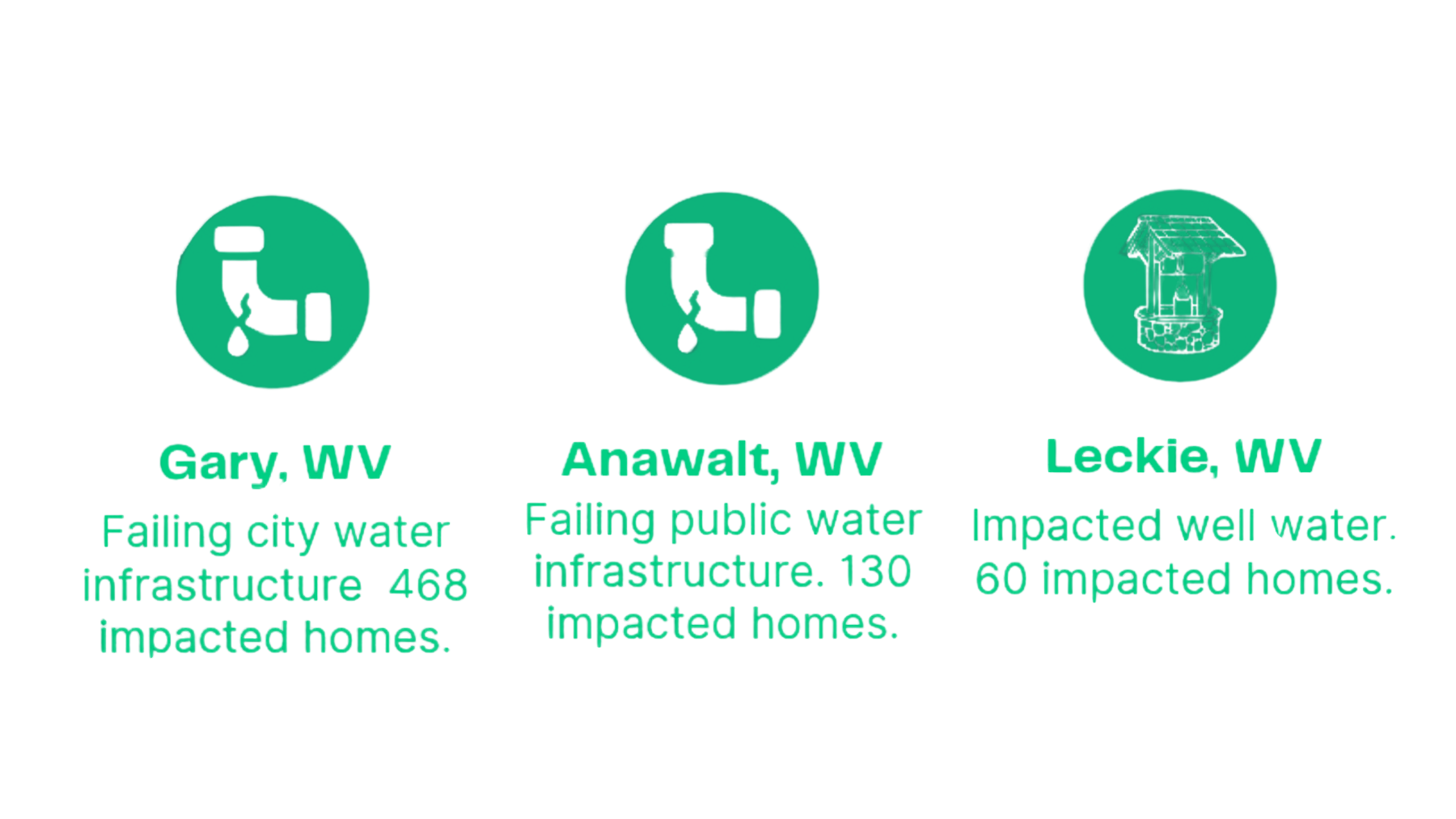
Thursday, February 6th, ReImagine Appalachia live-streamed a webinar with two residents of McDowell County, West Virginia, and two activist pastors who shared what day-to-day life is like amidst the area’s worsening drinking water crisis.
“It’s come to the point that we have to pay attention to the color clothing we buy because we know our water will ruin it” said Diane Farmer, resident of Leckie (Pronounced LACKIE) in McDowell County, where the water regularly runs orange or even black with contaminants.
“We do not even give our animals our well water, we buy water for them too.”
Failing infrastructure in the state’s coal country
For West Virginia’s southern coalfield counties, this is normal. Residents have experienced regular outages and consistent boil water advisories since 2019. Water lines break almost weekly, but without a local newspaper, getting word out about water advisories and outages is difficult. If locals want to be safe, they have to boil or buy bottled. Many collect their water from waterfalls on the side of the road.
“The thing that really hurt me was when my grandchild came and he said why can’t I get a drink of water out of your spigot or Why can’t I use your refrigerator to get water? And I told him we can’t drink this water. We have to use the bottles.” Said Betty Stepp, a resident of Anawalt, also in McDowell County.
Water quality issues have persisted for years in Southern West Virginia. Diane recalls the first issues arose for her family in the 80s, following oil and gas drilling near her house. Later, in 2001, flooding forced the family to have another well dug. But it was when strip mining commenced across the road from the family home in 2019 that things took a turn for the worse.
“Since then it’s just deteriorated until we use the water to clean, to take showers, and not even really to wash our clothes,” said Diane.

Current water crisis relief efforts fall short of what’s needed
In early February, State Senator Laura Chapman introduced Senate Bill 161, which attempts to address the issue by “providing water filtration equipment or technology to residents whose water is deemed unsafe”. However, for people like Diane Farmer, filtration systems have not only fallen short of fixing the issue but have also introduced problems of their own.
“We are in the process of trying to get a new filter that they claim will be better, but right now, with our age, the water systems you have to put salt in, and the salt comes in 40 to 50 lb. bags and my husband is no longer able to lift the bags and put it in the conditioner,” Diane said.
Reverend Caitlin Ware and Reverend Brad Davis publicly spoke out against SB 161 on their multichannel social media group, From Below. They argue that filtration systems are expensive and ineffective, looking instead to larger infrastructure investments in the state’s outdated water systems. They are circulating a petition that urges Governor Morrisey to declare a state of emergency for the southern counties and direct immediate funding to update the crumbling water system infrastructure. However, in recent years, the state has failed to show urgency on this issue, owing not to a lack of financial resources, but failure to distribute them equitably.
Even after a large influx of federal funds from the American Rescue Plan Act of 2021, West Virginia’s government has not been accountable for making sure the money went where it was most needed. They have prioritized the reconstruction of college baseball stadiums and performing arts centers in larger cities over the health and safety needs of smaller towns like Anawalt. As a result, countless residents in McDowell, Boone, Logan, Wyoming, Mingo, Lincoln, Raleigh, Mercer, and Fayette counties can’t get clean water.

The situation only got worse after recent flooding in West Virginia, Kentucky, Virginia, and Tennessee. Collapsed and obstructed roads are preventing residents from accessing water distribution points. Revs. Davis and Ware were even forced to cancel their “Bring Your Water to Charleston” advocacy day due to road closures and dangerous conditions. For now, they continue their work of raising awareness and organizing their parishioners to distribute water to communities. They are helped by individual donations, but since many households in the area are consuming $100 worth of bottled water a month and the lack of recycling facilities make this delivery method unsustainable, literally, there is growing pressure to win a top-down and permanent solution. Individuals seeking to help can sign the petition (here) or contribute using a donation portal (here).
For residents like Betty and Diane, a swift and comprehensive government solution to the water crisis is a critical health issue. The mounting tasks of transporting and filtering their water, as well as descaling and bleaching their contaminated utility outlets, increasingly bear down on their physical resilience. For Revs. Brad Davis and Caitlin Ware, it’s not only an issue of public health but of moral responsibility.
“Clean water is a gift from God, and all people are made in the image of God and therefore deserve to have access to clean water.” – Rev. Brad Davis.
